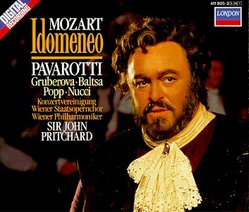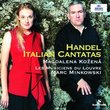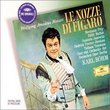| All Artists: Mozart, Pavarotti, Baltsa, Gruberova, Popp Title: Idomeneo Members Wishing: 0 Total Copies: 0 Label: Polygram Records Release Date: 3/14/1988 Genre: Classical Styles: Opera & Classical Vocal, Historical Periods, Classical (c.1770-1830) Number of Discs: 3 SwapaCD Credits: 3 UPC: 028941180520 |
Search - Mozart, Pavarotti, Baltsa :: Idomeneo
 | Mozart, Pavarotti, Baltsa Idomeneo Genre: Classical
Premiered two days before Mozart's 25th birthday, this is the first opera of his maturity (i.e., the amazing last 10 years of his too-short life). It is written in a modified form of opera seria, a Baroque rather than a ... more » |
Larger Image |
CD DetailsSynopsis
Amazon.com Premiered two days before Mozart's 25th birthday, this is the first opera of his maturity (i.e., the amazing last 10 years of his too-short life). It is written in a modified form of opera seria, a Baroque rather than a classical style, with a plot from Greek mythology and rigid structures that Mozart bent somewhat to his own preferences. It poses stylistic problems quite different from those raised by Don Giovanni or The Magic Flute, which are much closer to modern concepts of opera and, indeed, helped to establish those concepts. Pritchard's interpretation makes reasonable compromises (mostly short textual cuts) between the old-fashioned form and modern tastes. The women in his cast are excellent, as are the Viennese chorus and orchestra. Recommended for those who dislike music on period instruments. --Joe McLellan Similarly Requested CDs
|
CD ReviewsPavarotti's "Mozart" Experiment Goes Horribly Wrong 02/22/2006 (5 out of 5 stars) "This London/Decca recording is simultaneously wonderful and horrible. I don't mean to sound like I'm an Anti-Pavarotti detractor/basher but this role never suited him and is purely an experimental project for him as a tenor. He had already sung in this opera earlier in his career in the 60's- in the minor role of Idamante, which can be found in a live recording (that opera features Gundula Janowitz and Richard Lewis as Idomeneo). Everyone who knows opera knows that Pavarotti is primarily an Italian lyric tenor whose strongest repertoire was bel canto - namely Verdi and Donizetti, but also Puccini. Pavarotti singing Mozart ? It's a huge mistake to buy this recording. The role has lyric qualities but one has to have enough Mozartian operatic experience to perfectly essay the role with success. Consequently such tenors as Anthony Ralph Johnson and even Placido Domingo (who sang numerous Mozart tenor roles very early in his career including Don Ottavio and Tamino) score better success as Idomeneo. For me, only Placido Domingo in the Deutsche Grammophone recording satisfies me as the right choice for Idomeneo. Pavarotti is only delivering his same old razzle-dazzle, showy vocal pyrotechnics. He's so self-consciously grand and affected that one can almost see him waving his signature white handkerchief. So, please look to other Idomeneos but not this one. On the plus side, Edita Gruberova and Agnes Baltsa, both of whom are experienced Mozartian singers, deliver a splendid performance as Ilia and Idamante. Gruberova's light, lyric coloratura voice is well-placed and attuned to Mozart's music. Furthermore, her voice is dulcet in tone and pure, qualities which are essential to the Mozartian heroine. Gruberova may be wonderful, but I have myself heard better Ilias- that of Carol Vaness is outstanding and those of Arlene Auger and most recently Natalie Dessay. But kudos to Gruberova's wonderful performance. As for Anges Baltsa, she's remarkable. She never ceases to amaze me. She is the most flexible and versatile mezzo soprano in recorded history. In her recordings you'll find her singing excellent dramatic Princess Ebolis, Romeos from Gounod's Romeo et Juliette, Queen Elisabeth from Maria Stuarda, Dalilah in Saint-Saens' Samson among other roles. Here, she sings with amazing lung power and mezzo di voce, but also able to sing with decent coloratura. So, even if Pavarotti fails to impress, Gruberova and Baltsa (who have worked together before) make their usual great performance. As for the conductor and the orchestra's treatment of the score - honestly it could have been better. It's slow-paced, dull and lacking passion and fire." Not too generous with Pav this time. Abel | Hong Kong | 02/16/2007 (4 out of 5 stars) "I love Pavarotti's Italian operas.
With Mozart, it appears to be quite another story. This Idomeneo, though he sings quite well (especially the recitatives - don't laugh!), lacks the shimmer that he displays so well in the classical and romantic Italian repertoire. Mozart, when composing an Italian opera seria, commends a style that was more akin to baroque than classical in such genre. Even his last opera seria La Clemeza di Tito is more baroque than classical in a sense than his three operas buffa - the great da Ponte trio. Pavarotti does not seem to excel in baroque repertoire, so I would say that his attempt at Idomeneo is doomed from the outset. If Pavarotti really wanted to try his hand at Mozart, he should have picked, say, Ferrando in Cosi fan tutte instead of Idomeneo, or Idamante. So much for Pav. There is another major protagonist in this recording that I discover to be below her usual level of performance - Lucia Popp's Ilia. Her duets with Baltsa and her solo arias, are some how more insipid than lyrical. This is simply not Popp's usual self. Baltsa sings finely, though not in a level as she did when she sang Ascanio in Alba for Hager years ago. The only 'star' left standing aloft in this recording is Edita Gruberova. " |

 Track Listings (15) - Disc #1
Track Listings (15) - Disc #1








